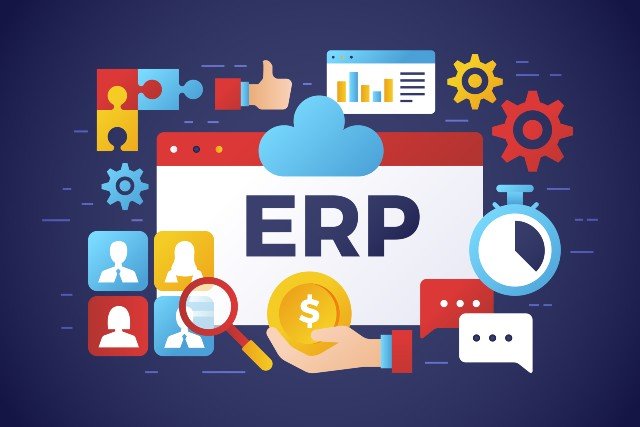Introduction
Understanding ERP Systems An Enterprise Resource Planning (ERP) system stands as a software solution that amalgamates diverse business processes and functions onto a unified platform. ERPs empower companies to efficiently manage their operations by simplifying processes, centralising data, and offering real-time insights. These encompass various domains including finance, human resources, inventory, supply chain, customer relationship management (CRM), and more. ERPs serve as a crucial tool for companies aiming to expand and grow.
The Importance of ERP Implementation
The benefits of implementing an ERP are not only plentiful, but they are unmatched. No other move will streamline your business the way introducing an ERP will. These benefits include:
- Enhanced Process Efficiency: ERPs automate and optimise tasks such as billing, revenue recognition, and inventory management, effectively reducing manual errors and efforts. This allows businesses to concentrate on pivotal tasks that drive growth.
- Real-time Insights: ERPs offer real-time data analytics, amalgamating data to facilitate informed decisions on resource allocation, KPIs, and future strategies.
- Scalability: ERPs flexibly expand alongside businesses, adapting to evolving requirements and supporting expansion. Notably, certain ERPs like Oracle NetSuite seamlessly integrate new subsidiaries, expediting the process of business expansion. Ensuring Regulatory Compliance: Many ERPs furnish tools for adhering to industry-specific regulations and standards.
- Augmented Collaboration: With diverse functions/modules such as project management, sales hubs, and CRM, ERPs facilitate cross-departmental access to information, promoting efficient collaboration and idea sharing.
- Centralised Data: Pertinent data is stored within a single system, ensuring uniformity and precise decision-making. This drastically curbs the chances of human errors and the complexities of data consolidation from disparate systems, instilling confidence in data accuracy.
Riding the Economic Surge
Southeast Asia’s Economic Prosperity The Southeast Asian region is currently experiencing robust economic growth. The six leading economies—Indonesia, Singapore, Vietnam, Malaysia, Thailand, and The Philippines—are projected to grow by 4.2% this year and 4.8% next year. This far outpaces the projected 1.1% growth of most developed nations. This underscores the prospective flourishing of businesses, emphasising the need for implementing robust ERP solutions to streamline finances and enhance operational efficiency.
Top ERP Solutions for Southeast Asian Enterprises
The following five ERP systems have garnered popularity in Southeast Asia.
SAP Business One
SAP Business One is tailor-made for small and medium-sized businesses across diverse industries. It offers a consolidated platform to oversee various business facets, encompassing finance, sales, customer relationship management, inventory, and procurement.
Key Features:
- User-Friendly Interface: SAP Business One boasts an intuitive interface for easy navigation.
- Seamless Integration: SAP Business One smoothly integrates with other SAP solutions and third-party applications.Tailored Customization:
- The system is adaptable to cater to industry-specific needs and processes.
- Robust Analytics and Reporting: It presents powerful reporting and analytics tools for real-time insights into business performance.
Oracle NetSuite
Oracle NetSuite, a cloud-based ERP solution, caters to both growing businesses and established enterprises. It spans various functionalities including financial management, e-commerce, and CRM.
Key Features:
- Cloud-Based Advantage: NetSuite’s cloud architecture enables hassle-free accessibility and scalability, eliminating the need for extensive IT infrastructure.
- Global Business Management: Facilitates multi-currency, multi-language, and multi-subsidiary operations for globally-reaching companies.
- E-Commerce Integration: Equipped with tools for efficient e-commerce platform management, order fulfillment, and customer engagement.
- SuiteCommerce Integration: Unifies e-commerce and in-store experiences to enhance customer interactions.
Microsoft Dynamics 365
Microsoft Dynamics 365 seamlessly merges ERP and CRM capabilities, offering a versatile solution tailored to diverse industries and business sizes.
Key Features:
- Modular Flexibility: Dynamics 365 comprises diverse modules, enabling businesses to select components aligned with their requirements. Integration with
- Microsoft Suite: Seamlessly integrates with Office 365, Power BI, and other Microsoft productivity tools.
- Leveraging AI and Machine Learning: Harnesses AI-driven insights for informed decision-making and enriched customer interactions.
- Tailored Industry Templates: Offers industry-specific templates such as those for retail, manufacturing, and finance, expediting implementation.
Epicor ERP
Epicor ERP is centered around manufacturing and distribution businesses, offering specialized features to optimize supply chain management, production, and financial operations.
- Key Features: Industry-Centric Approach: Epicor ERP is finely tuned for manufacturing, distribution, and automotive industries, catering to their distinctive challenges.
- Enhanced Mobility: Provides on-the-go access to vital business data and processes, enabling informed decisions from any location. Fostering
- Collaboration: Facilitates inter-departmental and inter-location communication and collaboration.
- Analytics for Excellence: Provides tools for predictive analytics and business intelligence, elevating operational efficiency.
Infor CloudSuite
Infor CloudSuite provides industry-specific ERP solutions bolstered by cloud capabilities, covering domains like finance, human capital management, and supply chain management.
Key Features:
- Tailored Industry Functionality: Infor delivers specialized solutions for industries such as healthcare, hospitality, and retail.
- Scalability Advantage: CloudSuite is adept at scaling in tandem with business needs, making it apt for both small and large enterprises.
- Adherence to Compliance and Regulations: Equipped with tools to aid businesses in conforming to industry standards and regulations.
- Enhanced User Experience: Emphasis on intuitive user interfaces and experiences to ensure seamless adoption.
Conclusion
In a nutshell, Southeast Asia’s economic prosperity necessitates robust ERPs to support business operations. These systems pave the way for heightened efficiency, informed decision-making, and streamlined workflows. The selection of an ERP should be guided by industry-specific requirements and business scale, with real-world success stories offering valuable insights into how these systems can propel achievement.



